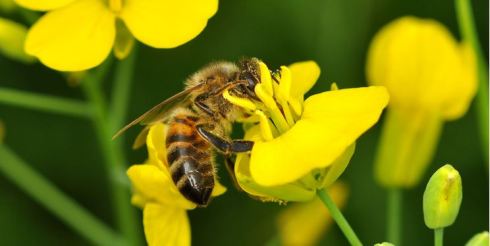FT: Syngenta and Bayer funded a $3m field study – but dismissed its conclusions9 Jul 
The un-named author of
a recent FT View opens by reminding readers of many factors often cited by scientists that may be behind the decline in bee populations across Europe and the US: habitat loss, disease and nutritional stress.
There are an estimated 3tn honey bees across the world. With their wild relatives they have been providing an essential service to mankind for millions of years.
The role that certain pesticides play in their decline has been fiercely disputed by environmentalists, farmers and industry lobbyists. In
an earlier FT article Chloe Cornish recalls that previous studies indicated that neonicotinoids
do harm bees, but were criticised because they were laboratory-based and did not replicate complex real world conditions.
It was conducted over a year at 33 sites across the UK, Hungary and Germany, over an area spanning 2,000 hectares. It concludes that neonicotinoids — a widely used group of pesticides applied to seeds before planting — can indeed damage the ability of bees to establish new populations.
The $3m field study was joint funded by the chemical companies Syngenta and Bayer companies which produce most of these pesticides, and The Centre for Ecology and Hydrology’s contributed £400,000.
The findings add to an accumulating body of scientific research suggesting that “neonics” are a big contributor to the problem. They have played a part both in the phenomenon known as colony collapse disorder, in which commercial bees suddenly and mysteriously die off, and also in the tragic decline of wild bee populations in Europe and the US.

Facing denial in the face of this growing evidence lead authors Richard Pywell (right) and Richard Shore (left) told reporters in London that they were braced for hostility, acknowledging that this was a contentious area. Bayer and Syngenta have dismissed the report’s conclusions as simplistic and inconsistent— reminding the writer of the tactics once used by tobacco companies to fend off health-related regulation.
The implications are grim. Bees and other pollinators play a role in the production of about a third of the food eaten. Without them, basics such as coffee, chocolate and almost every fruit and vegetable would become scarce at best.
Neonicotinoids may not be solely responsible for the bee crisis. But of the many stresses contributing to declining populations, pesticide use is the easiest to control. A hungry and sick bee is more likely to die if it is also poisoned. The scientific findings point to the need for action.

EU regulators decided the link was worrying enough to place restrictions on the use of clothianidin, thiamethoxam and another neonicotinoid, imidacloprid, in 2013. This moratorium comes up for debate again later this year – meanwhile regulators are re-evaluating the three and will present their findings in November. FT View ends:
“On the latest evidence, the partial ban should be extended. The danger, of course, is that farmers will resort to using something with equally nefarious effects — the western world’s record for regulating pesticides is terrible.
”It is time that changed. It is time to look after bees as well as they look after us”.
